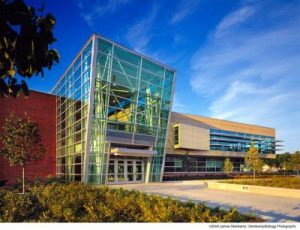3/17/2005
While visiting a new Chicago high school built to relieve overcrowding, Mayor Richard M. Daley called on the State of Illinois to better fund education in 2006, pointing out that schools statewide received no funding for capital improvements this year.
Until this year, the State has annually provided $500 million in school capital funding statewide. Chicago has typically received about $110 million. Current proposals could restore capital funding next year, but offer just $140 million more to meet operating costs and unfunded state mandates, such as special education.
The Chicago Public Schools is facing a $175 million budget gap in 2006, even after announcing $49 million in non-classroom cuts. CPS could get as little as $16 million more from the State in 2006, requiring even more drastic cuts.
“What’s currently on the table for next year’s budget is far less than is needed,” Daley said at a press conference at North-Grand High School, 4338 W. Wabansia Ave.
“We’re thankful for the progress that’s been made in recent years,” he added. “And we understand the financial challenges the state is facing. But the bottom line remains that today the State of Illinois underfunds education.”
Daley highlighted a program at North-Grand called AVID (Advancement Via Individual Determination). AVID helps mid-tier students get into college by requiring them and their parents to sign a contract vowing to stay out of trouble, attend school regularly and enroll in college-level courses while in high school.
North-Grand, a brand new $37 million state-of-the-art school with a capacity of 1,000, began admitting freshmen last fall to help relieve overcrowding at nearby Kelvyn Park High School. It is one of 20 public high schools in Chicago offering AVID, but the only one using the “whole school” approach, under which every student at the school is enrolled in the program.
CPS Chief Executive Officer Arne Duncan said, “AVID inspires kids to push themselves. The kids involved have higher test scores and higher attendance. We’d like to double the number of schools in the program next year, but, like everything else we are doing, it costs money.”
A month ago, CPS officials called for $175 million in new state funding for 2006 to cover rising operating costs, state mandates such as special education, early childhood and bilingual programs and teacher pensions. For Chicago to receive $175 million, under the standard formula, Illinois would need to provide about $600 million more next year for education, far more than the $140 million under discussion.
The Mayor warned that further cuts could come if the State does not meet its responsibility. He also emphasized that local taxpayers cannot meet the rising costs of education each year.
“Each year, the Chicago Public Schools system has cut spending and better managed its resources – to avoid classroom cuts, to minimize property tax hikes and to meet higher accountability standards,” Daley said, adding, “But it can’t go on like this forever. Local taxpayers are being squeezed and the state needs to do more.”
Daley went on to say that even with additional funding this year, Illinois needs long-term reform in the way the state s funds education.
“I know the Governor didn’t create this problem – and no one expects him to solve it overnight,” the Mayor said. “We give him credit for his commitment to improve our schools and for the extra money he has put into education. But this year we need more funding for our schools. And we all need to start addressing the issue of long-term funding reform.”
Highlighting rising test scores, declining dropout rates and other improvements since he took control of the schools in 1995, Daley said, “We cannot put our educational progress at risk.”
This year, because the State provided no capital funding, CPS is deferring $110 million in needed repair projects and school<
